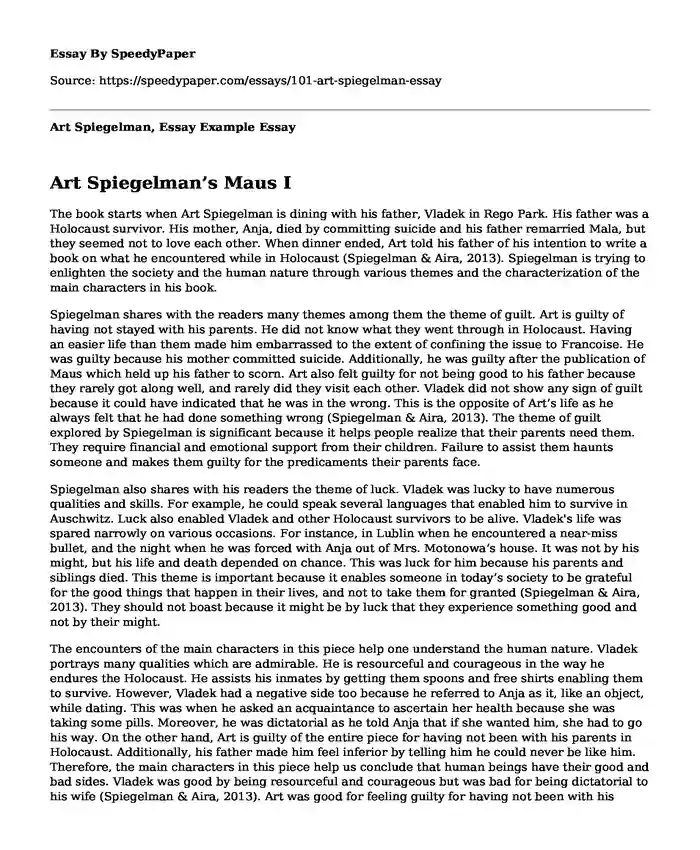
| Type of paper: | Essay |
| Categories: | Literature Art American literature Holocaust |
| Pages: | 3 |
| Wordcount: | 739 words |
Art Spiegelman’s Maus I
The book starts when Art Spiegelman is dining with his father, Vladek in Rego Park. His father was a Holocaust survivor. His mother, Anja, died by committing suicide and his father remarried Mala, but they seemed not to love each other. When dinner ended, Art told his father of his intention to write a book on what he encountered while in Holocaust (Spiegelman & Aira, 2013). Spiegelman is trying to enlighten the society and the human nature through various themes and the characterization of the main characters in his book.
Spiegelman shares with the readers many themes among them the theme of guilt. Art is guilty of having not stayed with his parents. He did not know what they went through in Holocaust. Having an easier life than them made him embarrassed to the extent of confining the issue to Francoise. He was guilty because his mother committed suicide. Additionally, he was guilty after the publication of Maus which held up his father to scorn. Art also felt guilty for not being good to his father because they rarely got along well, and rarely did they visit each other. Vladek did not show any sign of guilt because it could have indicated that he was in the wrong. This is the opposite of Art’s life as he always felt that he had done something wrong (Spiegelman & Aira, 2013). The theme of guilt explored by Spiegelman is significant because it helps people realize that their parents need them. They require financial and emotional support from their children. Failure to assist them haunts someone and makes them guilty for the predicaments their parents face.
Spiegelman also shares with his readers the theme of luck. Vladek was lucky to have numerous qualities and skills. For example, he could speak several languages that enabled him to survive in Auschwitz. Luck also enabled Vladek and other Holocaust survivors to be alive. Vladek's life was spared narrowly on various occasions. For instance, in Lublin when he encountered a near-miss bullet, and the night when he was forced with Anja out of Mrs. Motonowa’s house. It was not by his might, but his life and death depended on chance. This was luck for him because his parents and siblings died. This theme is important because it enables someone in today’s society to be grateful for the good things that happen in their lives, and not to take them for granted (Spiegelman & Aira, 2013). They should not boast because it might be by luck that they experience something good and not by their might.
The encounters of the main characters in this piece help one understand the human nature. Vladek portrays many qualities which are admirable. He is resourceful and courageous in the way he endures the Holocaust. He assists his inmates by getting them spoons and free shirts enabling them to survive. However, Vladek had a negative side too because he referred to Anja as it, like an object, while dating. This was when he asked an acquaintance to ascertain her health because she was taking some pills. Moreover, he was dictatorial as he told Anja that if she wanted him, she had to go his way. On the other hand, Art is guilty of the entire piece for having not been with his parents in Holocaust. Additionally, his father made him feel inferior by telling him he could never be like him. Therefore, the main characters in this piece help us conclude that human beings have their good and bad sides. Vladek was good by being resourceful and courageous but was bad for being dictatorial to his wife (Spiegelman & Aira, 2013). Art was good for feeling guilty for having not been with his parents in Holocaust, but he was bad by allowing his father’s sentiments to make him feel inferior.
In conclusion, Art Spiegelman’s_ Maus I has the theme of guilt seen when Art was not able to stay with his parents in Holocaust. Hence, he did not experience the difficult life they faced. The theme of luck is also evident because Vladek’s survival in Holocaust was by luck. The main characters portray that human beings have their good and bad sides as seen in the behavior of Vladek and Art.
Reference
Spiegelman, A. & Aira, C. (2013). Maus [I] (4th Ed.). Mexico, D.F.: Emece Editores.
Cite this page
Art Spiegelman, Essay Example. (2018, Jun 22). Retrieved from https://speedypaper.net/essays/101-art-spiegelman-essay
Request Removal
If you are the original author of this essay and no longer wish to have it published on the SpeedyPaper website, please click below to request its removal:
- Free Essay on the Environmental Policy in the USA
- Research Paper Example on Online Education
- American Experience | The Mine Wars, Free Essay with a Documentary Analysis
- Depression Research Paper Example
- Essay Sample on the Documentary In the White Man's Image
- Followership and Servant Leadership - Comparison Essay Example
- Essay Sample on Evidence-Based Strategies for Preventing Seclusion and Restraint
Popular categories




